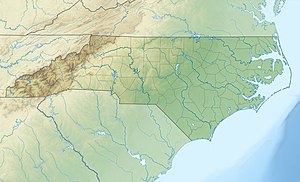Black Run Creek
Appearance
| Black Run Creek Tributary to Dutch Buffalo Creek | |
|---|---|
| Location | |
| Country | United States |
| State | North Carolina |
| County | Cabarrus |
| Physical characteristics | |
| Source | Second Creek divide |
| • location | about 4 miles northeast of Watts Crossroads, North Carolina[2] |
| • coordinates | 35°30′07″N 080°25′24″W / 35.50194°N 80.42333°W[1] |
| • elevation | 770 ft (230 m)[2] |
| Mouth | Dutch Buffalo Creek |
• location | about 2 miles north of Mount Pleasant, North Carolina[3] |
• coordinates | 35°26′21″N 080°26′20″W / 35.43917°N 80.43889°W[1] |
• elevation | 562 ft (171 m)[3] |
| Length | 5.12 mi (8.24 km)[4] |
| Basin size | 6.05 square miles (15.7 km2)[5] |
| Discharge | |
| • location | Dutch Buffalo Creek |
| • average | 7.35 cu ft/s (0.208 m3/s) at mouth with Dutch Buffalo Creek[5] |
| Basin features | |
| Progression | Dutch Buffalo Creek → Rocky River → Pee Dee River → Winyah Bay → Atlantic Ocean |
| River system | Pee Dee River |
| Tributaries | |
| • left | unnamed tributaries |
| • right | unnamed tributaries |
| Bridges | Kluttz Road, Haystack Drive, Gold Hill Road |
Black Run Creek is a 5.12 mi (8.24 km) long first order tributary to Dutch Buffalo Creek in Cabarrus County, North Carolina.
Course
[edit]Black Run Creek rises about 4 miles northeast of Watts Crossroads, North Carolina,[2] and then follows a southerly course to join Dutch Buffalo Creek about 2 miles north of Mount Pleasant.[3]
Watershed
[edit]Black Run Creek drains 6.05 square miles (15.7 km2) of area, receives about 47.1 in/year of precipitation, has a wetness index of 433.00, and is about 43% forested.[5]
References
[edit]- ^ a b "GNIS Detail - Black Run Creek". geonames.usgs.gov. US Geological Survey. Retrieved 14 November 2020.
- ^ a b c "Get Maps". USGS Topoview. US Geological Survey. Retrieved 14 November 2020.
- ^ a b c "Get Maps". USGS Topoview. US Geological Survey. Retrieved 14 November 2020.
- ^ "ArcGIS Web Application". epa.maps.arcgis.com. US EPA. Retrieved 14 November 2020.
- ^ a b c "Black Run Creek Watershed Report". US EPA Geoviewer. US EPA. Retrieved 14 November 2020.


